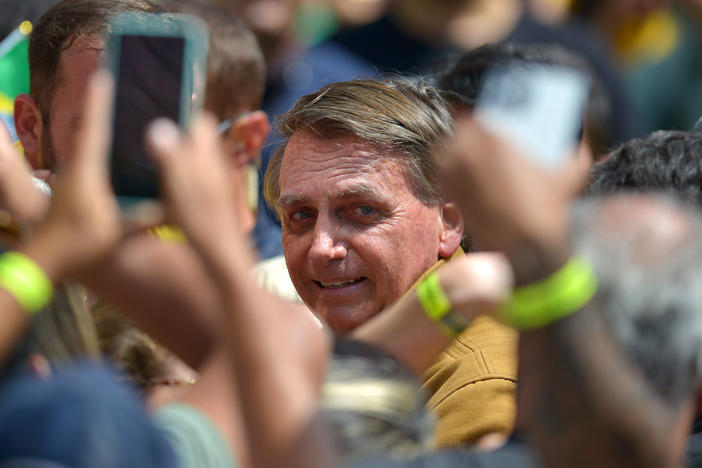Section Branding
Header Content
A far-right candidate is the front-runner in Chile's presidential election
Primary Content
Chile holds the first round of its presidential election Sunday. A far-right candidate is the unexpected front-runner.
Transcript
MARY LOUISE KELLY, HOST:
We turn now to Chile, where there is a presidential election on Sunday. Voters will decide who should replace the unpopular multimillionaire Sebastian Pinera. As NPR's Philip Reeves reports, Sunday's vote is the first round in a contest that has taken an unexpected tilt towards the far right.
(SOUNDBITE OF ARCHIVED RECORDING)
UNIDENTIFIED GROUP: (Speaking Spanish).
PHILIP REEVES, BYLINE: Two years ago, millions took to the streets of Chile.
(SOUNDBITE OF ARCHIVED RECORDING)
UNIDENTIFIED GROUP: (Speaking Spanish).
REEVES: The protests went on for weeks.
DIEGO LEPPEZ: (Speaking Spanish).
REEVES: There are problems with the current government, says Diego Leppez, who took part in that uprising. He lost an eye to a missile fired by the police. Even after that, he carried on protesting, believing this would end social inequality and bury the economic model imposed decades ago by the dictatorship of Augusto Pinochet. These days, Leppez isn't sure his sacrifice was worth it. He says his life hasn't improved.
LEPPEZ: (Speaking Spanish).
REEVES: He's still suffering psychological trauma from his injury, he says. At 29, he's struggling to hold down jobs. Now Leppez is watching with alarm as Chile enters a presidential election in which an unexpected frontrunner is Jose Antonio Kast, a candidate from the far right.
ROBERT FUNK: Jose Antonio Kast belongs to a political family. His brother was a minister during the dictatorship of Pinochet.
REEVES: Robert Funk is a political scientist at the University of Chile. He explains that Kast is a 55-year-old lawyer who used to be a mainstream congressman. In 2018, he set up his own party and shifted ground.
FUNK: Kast has moved from a more traditional kind of Chilean right to what you might want to call something like a populist, nationalist right, which is the kind of right we've seen emerging in other places like Brazil and the States, places in Europe.
REEVES: When Brazil's far-right President Jair Bolsonaro was elected, Kast wasted no time in visiting, says Funk. As for Donald Trump, Kast has a less strident style than him, but he shares some of Trump's views.
FUNK: One of his proposals is to build a ditch or a moat on the northern border to prevent immigrants from slipping through. So we can - you know, you can imagine where he gets that idea from.
REEVES: It's the final televised presidential debate. Seven candidates are running. All eyes are on Kast. A moderator challenges Kast over complaints he's made about what he calls Chile's gay lobby. "Isn't that discriminatory," she says.
(SOUNDBITE OF ARCHIVED RECORDING)
UNIDENTIFIED PERSON: (Speaking Spanish).
JOSE ANTONIO KAST: (Speaking Spanish).
REEVES: "Why," Kast says.
(SOUNDBITE OF ARCHIVED RECORDING)
UNIDENTIFIED PERSON: (Speaking Spanish).
KAST: (Speaking Spanish).
REEVES: "There is a gay lobby," he says. The other favorite in the race weighs in. Gabriel Boric is a former student leader who's only 35. He heads a leftist coalition allied to the Communist Party.
(SOUNDBITE OF ARCHIVED RECORDING)
GABRIEL BORIC: (Speaking Spanish).
REEVES: Boric quotes passages from Kast's program about banning same-sex marriage, cracking down on left-wing activists and scrapping Chile's ministry for women. Kast's rise is a departure from 2019, when Chileans appeared to be tilting leftwards. They demanded government provide decent health care and pensions and later elected a people's assembly to rewrite the Pinochet-era constitution. Yet the picture was always more complicated than that, says political analyst Lisa Zanotti.
LISA ZANOTTI: I wouldn't say that the ideology of the people who took the streets was, like, necessarily left-wing. So I think it was a sort of protest of the people versus the elite.
REEVES: Kast's success is still far from certain. Polling in Chile is often inaccurate, and analysts think he may struggle in the second round. Diego Leppez, the protester who lost an eye, hopes they're correct.
LEPPEZ: (Speaking Spanish).
REEVES: He says he'd rather leave Chile than be ruled by President Kast. Philip Reeves, NPR News. Transcript provided by NPR, Copyright NPR.
Bottom Content


